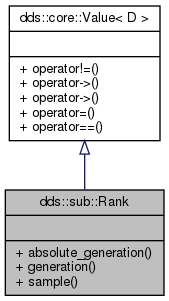 |
OpenSplice ISO C++ 2 DCPS
v6.x
ISO C++ 2 OpenSplice Data Distribution Service Data-Centric Publish-Subscribe API
|
 |
OpenSplice ISO C++ 2 DCPS
v6.x
ISO C++ 2 OpenSplice Data Distribution Service Data-Centric Publish-Subscribe API
|
Class to hold sample Rank information and is part of dds::sub::SampleInfo. More...
#include "Rank.hpp"

Public Member Functions | |
| int32_t | absolute_generation () const |
| int32_t | generation () const |
| bool | operator!= (const Value &other) const |
| D * | operator-> () |
| const D * | operator-> () const |
| bool | operator== (const Value &other) const |
| int32_t | sample () const |
Class to hold sample Rank information and is part of dds::sub::SampleInfo.
The sample_rank and generation_rank available in dds::sub::Rank are computed based solely on the actual samples in the ordered collection returned by read or take.
The generation_rank is computed using the formula:
generation_rank = (MRSIC.disposed_generation_count + MRSIC.no_writers_generation_count) - (S.disposed_generation_count + S.no_writers_generation_count)
The absolute_generation_rank indicates the difference in 'generations' between the sample (S) and the Most Recent Sample of the same instance that the middleware has received (MRS). That is, it counts the number of times the instance transitioned from not-alive to alive in the time from the reception of the S to the time when the read or take was called.
The absolute_generation_rank is computed using the formula:
absolute_generation_rank = (MRS.disposed_generation_count + MRS.no_writers_generation_count) - (S.disposed_generation_count + S.no_writers_generation_count)
| int32_t dds::sub::Rank::absolute_generation | ( | ) | const |
Gets the absolute_generation_rank.
The absolute_generation_rank indicates the difference in 'generations' between the sample (S) and the Most Recent Sample of the same instance that the middleware has received (MRS). That is, it counts the number of times the instance transitioned from not-alive to alive in the time from the reception of the S to the time when the read or take was called.
The absolute_generation_rank is computed using the formula:
absolute_generation_rank = (MRS.disposed_generation_count + MRS.no_writers_generation_count) - (S.disposed_generation_count + S.no_writers_generation_count)
Definition at line 47 of file RankImpl.hpp.
|
inline |
Gets the generation_rank.
The generation_rank indicates the difference in 'generations' between the sample (S) and the Most Recent Sample of the same instance that appears In the returned Collection (MRSIC). That is, it counts the number of times the instance transitioned from not-alive to alive in the time from the reception of the S to the reception of MRSIC.
The generation_rank is computed using the formula:
generation_rank = (MRSIC.disposed_generation_count + MRSIC.no_writers_generation_count) - (S.disposed_generation_count + S.no_writers_generation_count)
Definition at line 53 of file RankImpl.hpp.
|
inherited |
|
inherited |
The operator->() is provided to be able to directly invoke functions on the delegate.
The decision to provide direct access to the delegate was motivated by the need for providing a way that was not invasive with respect to the CXXDDS API and yet would allow for vendor-specific extension. Thus vendor-specific extensions can be invoked on the Value and on all its subclasses as follows:
|
inherited |
The operator->() is provided to be able to directly invoke functions on the delegate.
The decision to provide direct access to the delegate was motivated by the need for providing a way that was not invasive with respect to the CXXDDS API and yet would allow for vendor-specific extension. Thus vendor-specific extensions can be invoked on the Value and on all its subclasses as follows:
|
inherited |
|
inline |
Gets the sample_rank.
The sample_rank indicates the number of samples of the same instance that follow the current one in the collection.
Definition at line 59 of file RankImpl.hpp.